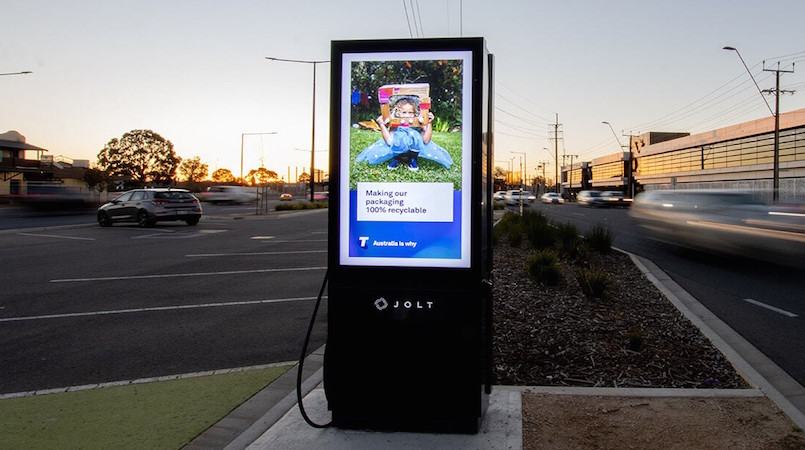First party data from digital out-of-home, $1000 value exchange, cleaner results, decarbonised advertising: Why JOLT is the future of DOOH

JOLT is about to rollout its Sydney premium digital out of home and electric vehicle charging network. Big brands and agencies are already onboard, tapping first party data from premium audiences while delivering on sustainability commitments. Welcome to the future of out of home advertising.
What you need to know:
- JOLT is Australia’s first fully digital premium out-of-home (OOH) network that is powered on first party data, with chargers integrated with its bus shelter-sized screens.
- It provides advertisers with access to rich first party data on premium audiences, giving consumers up to $1000 annual value exchange, while enabling brands and agencies to demonstrably deliver on sustainability targets and help fund cleaner transport infrastructure.
- Telstra and OMD are using the network, now live in Adelaide with Sydney rollout in partnership with Ausgrid beginning September.
- Fully flexible, fully audience-led digital out-of-home capability.
Data-driven out-of-home, sustainable media
Social purpose and first party data are two of the biggest agenda items for marketers and brands like Telstra, Commbank, IAG, Suncorp, Telstra, Westpac and Woolworths – some of Australia’s biggest advertisers – are committed to decarbonising supply chains, including media.
Meanwhile, Australia is coming under increasing international pressure to cut emissions while carmakers globally are phasing out combustion engines in favour of electric vehicles (EVs).
The marketing industry is simultaneously grappling with how to build first party data capability as Australia’s privacy laws are overhauled and Google and Apple make sweeping changes to tracking.
These shifts present huge challenges for brands and their partners – but equally huge opportunities.
JOLT, an EV charging network and the newest digital out-of-home network, aims to help marketers and agencies deliver on sustainability and social purpose obligations, while providing better first party audience data than any other out-of-home provider can currently deliver – with a powerful value exchange for consumers.
Free charging, first party data
JOLT’s network of electric vehicle chargers gives EV drivers free fast charging via an app. The app data provides a complete picture of drivers’ collective movements and therefore a clearer picture of the audiences that have seen programmatic ads via its network of screens, located roadside and adjacent to high traffic areas such as petro-convenience stores.
While brands and publishers are trying to figure out compelling value exchanges in return for consumer data, JOLT has a powerful answer: Quarter of an hour of free charging – up to 45kms of range in an electric vehicle – which can be worth more than $1000 a year to EV drivers.
That first party data, alongside third party tools that provide a richer view of broader audiences passing JOLT’s street network, give advertisers a clearer view of audiences, deeper targeting opportunities and the ability to better measure results. The network also delivers demonstrable proof that brands are decarbonising media supply chains, as JOLT’s charging stations are powered by renewable energy.
Brands using JOLT’s network are therefore demonstrably contributing to broader environmental social and corporate governance (ESG) goals, by reducing the cost of electric vehicles and helping to overcome barriers to EV adoption – given ‘range anxiety’, the fear of running out of power due to limited charging infrastructure, is one of the single biggest inhibitors.
Receptive, engaged audiences buy more
Meanwhile, EV early adopters tend to be socially and environmentally conscious in their purchase decisions. JOLT’s digital out-of-home network provides advertisers and brands aligned with social purpose a much greater chance of reaching receptive audiences.
JOLT’s first metro network in Adelaide, which has already given out more than 65,000KM of free charging, shows EV drivers actively seek out JOLT charging locations again and again.
Decarbonising media
Brands are recognising the opportunity – and the market is starting to move. Telstra via OMD Sydney recently used JOLT’s network to launch its new brand campaign around sustainability, which is now central to the Telstra’s business.
The telco has put environmental and social corporate governance (ESG) at the top of its agenda, and CMO Jeremy Nicholas has urged the media industry to align with its goals.
“As the country’s biggest telco and a leader on climate action, a principal sponsor of sport and the arts and strong supporter of the communities we serve, we are committed to Australia and to building world-class infrastructure,” said Nicholas.
Telstra has also committed to decarbonise its supply chain, including media – and others will follow.
“If media companies, agencies and technology vendors want to maximise their commercial opportunities,” said Nicholas, “it’s in their best interests to do that.”
Want sharper, cleaner results from your digital out of home campaigns? Join us at jolt.com.au
